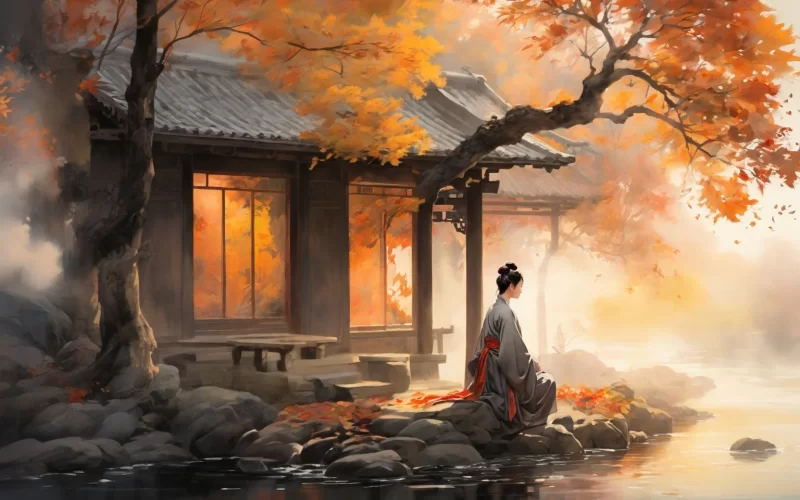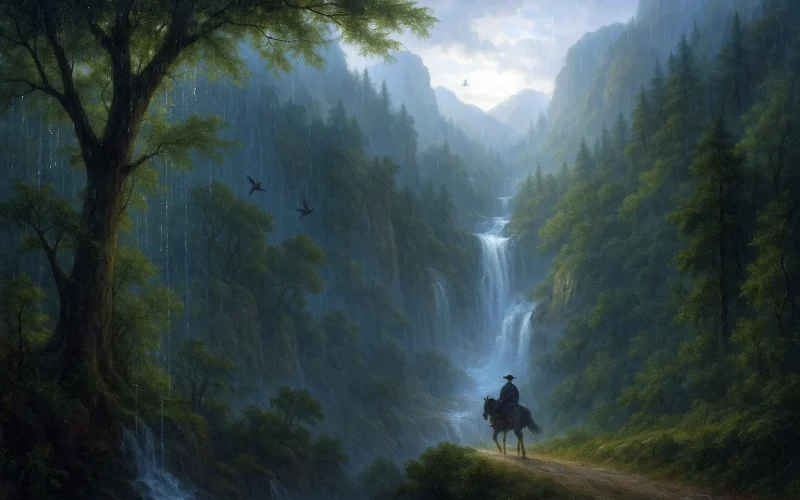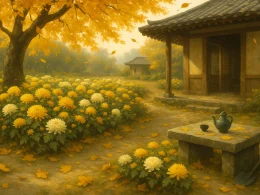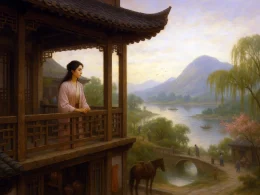The mountains are cold and blue now
And the autumn waters have run all day.
By my thatch door, leaning on my staff,
I listen to cicadas in the evening wind.
Sunset lingers at the ferry,
Supper-smoke floats up from the houses.
...Oh, when shall I pledge the great Hermit again
And sing a wild poem at Five Willows?
Original Poem
「辋川闲居赠裴秀才迪」
王维
寒山转苍翠,秋水日潺湲。
倚杖柴门外,临风听暮蝉。
渡头余落日,墟里上孤烟。
复值接舆醉,狂歌五柳前。
Interpretation
This poem is part of an exchange between Wang Wei and his close friend Pei Di, composed during their retreat in Wangchuan. It depicts their serene pastoral life in the mountains while expressing their shared transcendental ideals. Blending autumn landscapes with reclusive spirituality, the verses create a perfect fusion of scene and sentiment—a portrait of Wangchuan where nature and self dissolve into harmony.
First Couplet: "寒山转苍翠,秋水日潺湲。"
Hán shān zhuǎn cāng cuì, qiū shuǐ rì chán yuán.
Cold mountains deepen to emerald;
Autumn streams ripple day after day.
The seasonal setting emerges through "cold mountains" and "autumn streams." The verb "deepen" (转) captures the twilight's chromatic shift, while "ripple" (潺湲) animates the scene with liquid rhythm—balancing stillness and motion.
Second Couplet: "倚杖柴门外,临风听暮蝉。"
Yǐ zhàng chái mén wài, lín fēng tīng mù chán.
Leaning on my staff by the wood gate,
I listen to dusk cicadas in the wind.
Wang Wei's "leaning" posture epitomizes reclusive ease. The "wood gate" and "dusk cicadas" construct an eremitic atmosphere, sculpting an image of the poet as a sage detached from worldly cares.
Third Couplet: "渡头余落日,墟里上孤烟。"
Dù tóu yú luò rì, xū lǐ shàng gū yān.
At the ferry—lingering sunset glow;
Over the village—a lone smoke plume rises.
This parallel couplet paints evening's ephemeral beauty: "lingering" (余) hints at sunset's fleeting grace, while "rises" (上) traces the smoke's ascent with calligraphic precision—showcasing Wang Wei's painterly poetics.
Fourth Couplet: "复值接舆醉,狂歌五柳前。"
Fù zhí Jiē Yú zuì, kuáng gē Wǔ Liǔ qián.
Here comes my drunken Jieyu,
Singing wildly before Five Willows.
Alluding to the mad hermit Jieyu (接舆) and Tao Yuanming (五柳先生 "Master Five Willows"), Wang humorously casts Pei Di as a tipsy sage and himself as Tao—celebrating their shared devotion to reclusive joy.
Holistic Appreciation
The poem progresses from landscape to human connection, interweaving Wangchuan's autumn vistas with camaraderie. Wang Wei first establishes the mountains' quiet grandeur, then introduces human presence—both solitary (his meditative stance) and communal (Pei Di's exuberant visit). The structure mirrors their life: nature's rhythms framing moments of friendship. Through this balance, the poet reveals his heartfelt devotion to reclusive living.
Artistic Merits
This poem's most striking features lie in its fresh and delicate landscapes, subtle yet vivid character portrayals, and economical yet meaningful allusions. Through the regulated verse's parallel couplets, Wang Wei transforms poetry into painted scenes, achieving his signature ideal of "painting within poetry and figures within painting."
Insights
Wang Wei's verses model how spiritual serenity and human bonds can flourish through communion with nature. In our hyperconnected era, his poem whispers: true connection begins with inner stillness, and the simplest moments—a sunset, a friend's laughter—can become sacred when witnessed fully. The Wangchuan retreat thus endures not as escapism, but as an invitation to recalibrate life's pace and priorities.
Poem translator
Kiang Kanghu
About the poet

Wang Wei (王维), 701 - 761 A.D., was a native of Yuncheng, Shanxi Province. Wang Wei was a poet of landscape and idylls. His poems of landscape and idylls, with far-reaching images and mysterious meanings, were widely loved by readers in later generations, but Wang Wei never really became a man of landscape and idylls.












